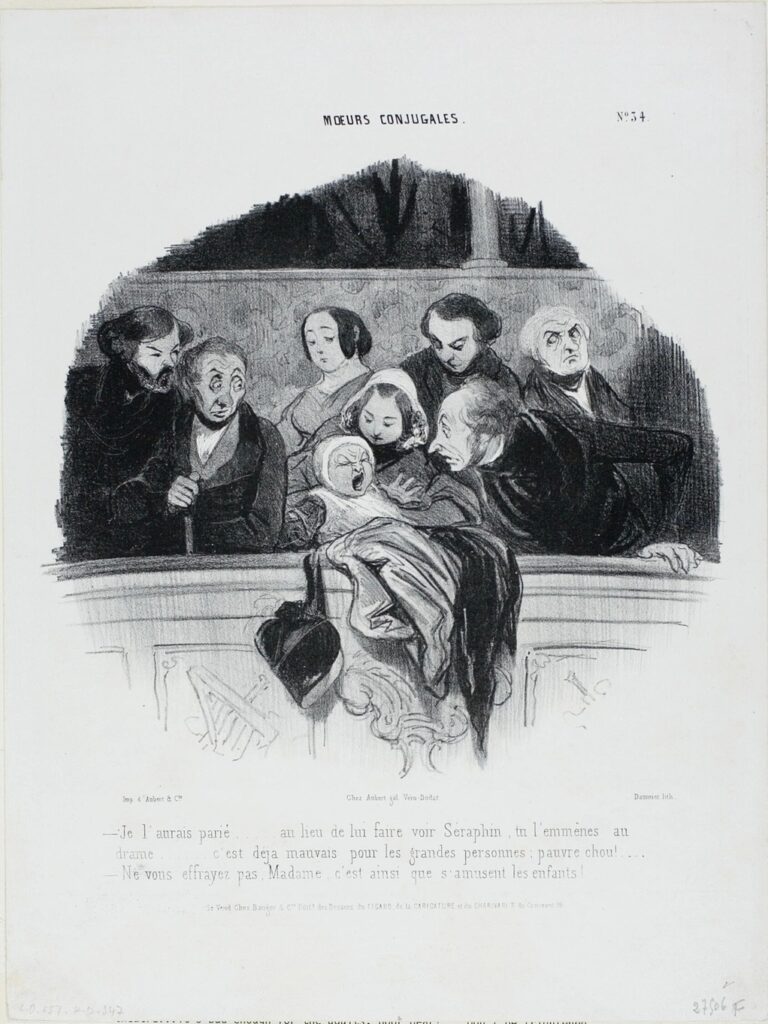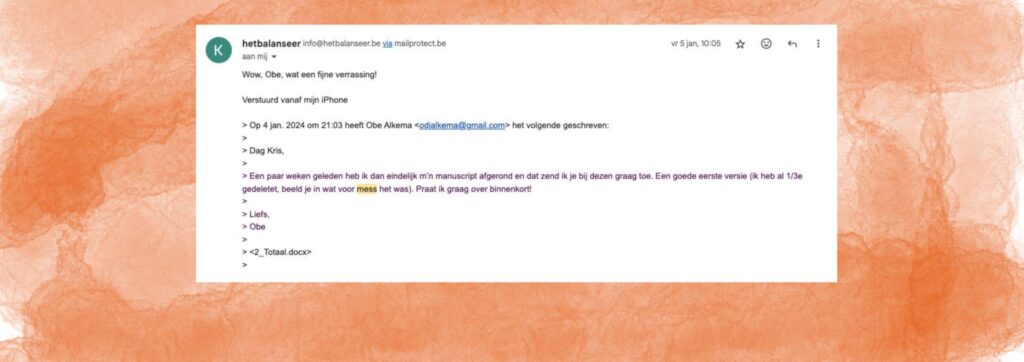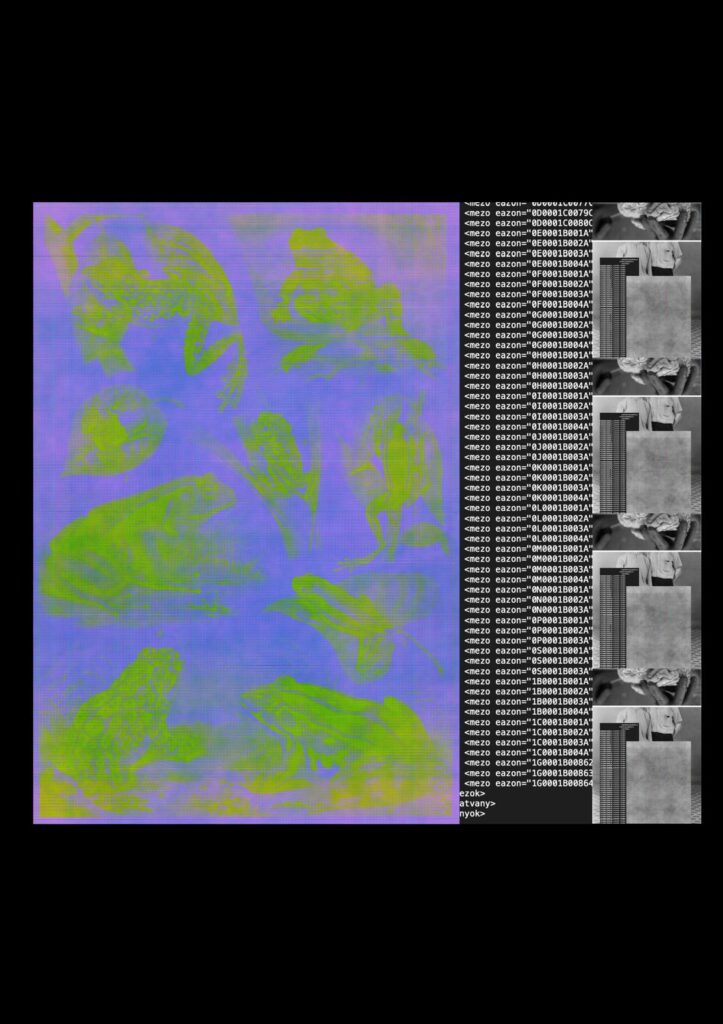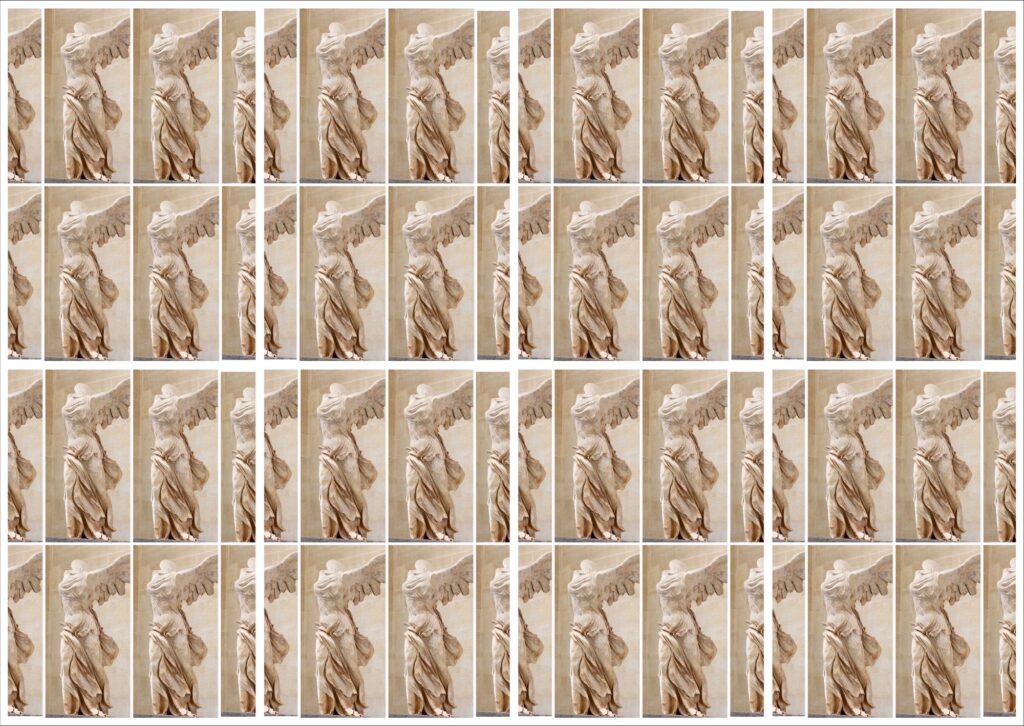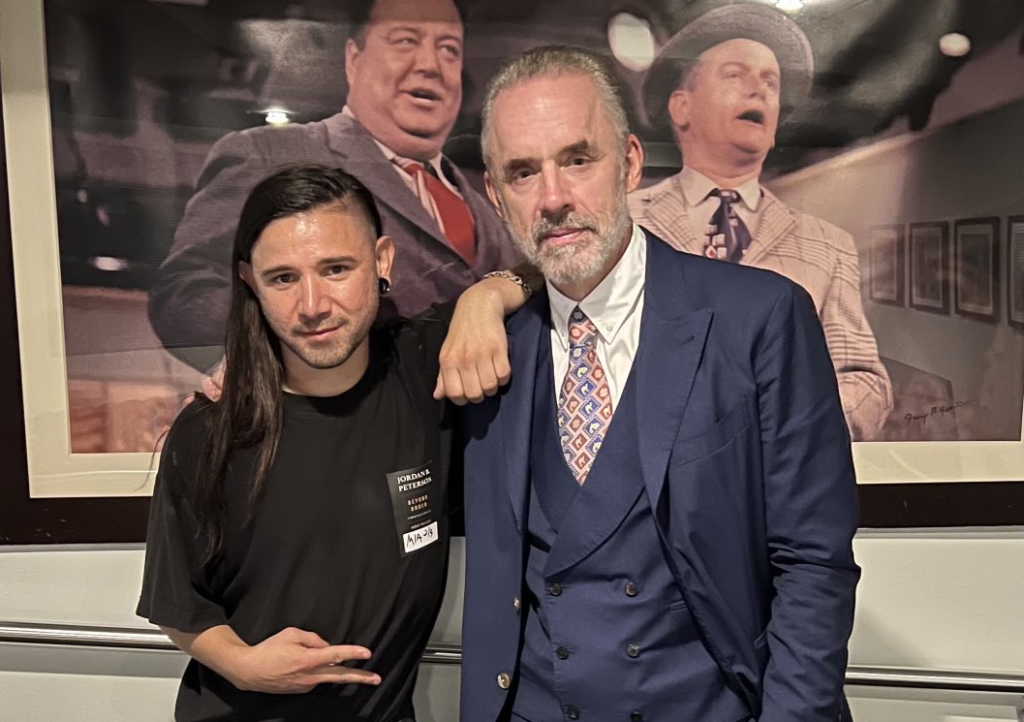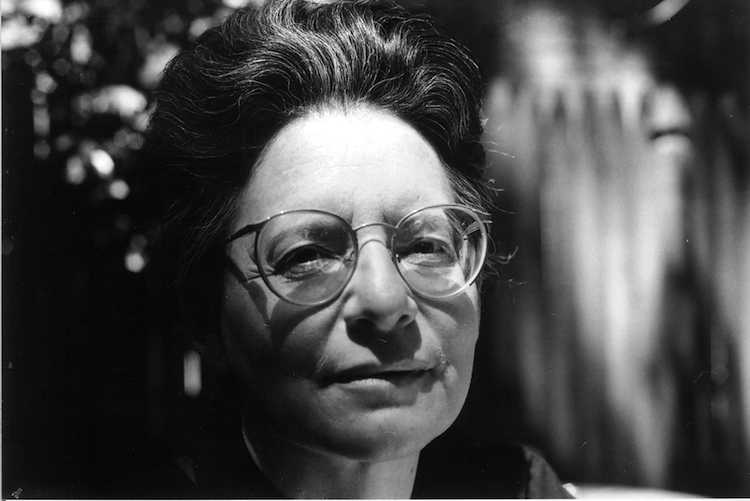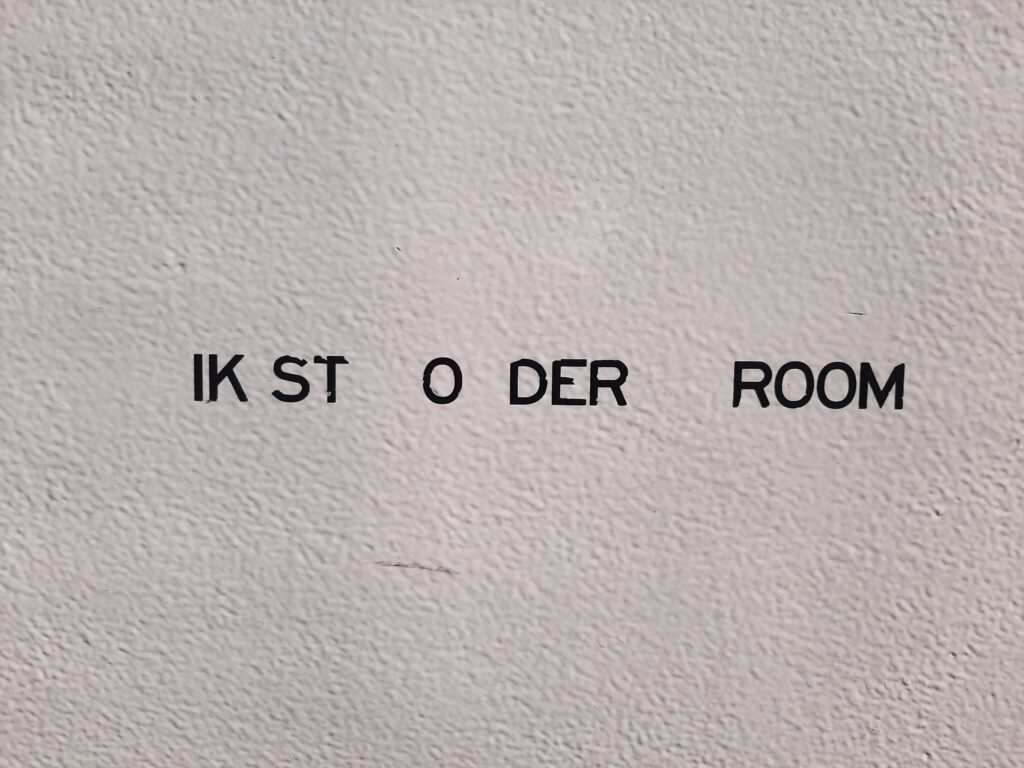Speculations on European Poetry
By Frank Keizer & Samuel Vriezen
What politics, the one that germinates from the poem, from the drives of language,
from a subject that can’t be restrained and unpronounceable extends (psyche, life)
to the ends of the Earth, conceives itself as one ghost among many and assembles
itself in the multiple organs of the territory, up to the finisterræ where dreams
fracture, ideologies, pneuma, the dead? What politics, outside the pack, outside the flag,
where breath fractures?
SV To discuss the possibility of a political poetry of Europe, it seems fitting to start from its very limit. The quote above is taken from Chus Pato’s poem Finisterra, from her book Secession, as translated from the Galician by the Montréal-based Canadian poet, Erín Moure. Finisterra is from the Latin, a word indicating the end of the earth. It’s a rocky peninsula just off Santiago de Compostela. Supposedly, the Romans viewed it as the westernmost point of the Iberian peninsula, and thereby of mainland Europe, though this is not quite accurate (Cabo da Roca in Portugal extends just a few miles more Westward). ! Surely, the limits of a territorial project would be a natural starting point from which to think its politics, and particularly a project like Europe, which does not offer a natural language in which it should be conducted. This renders Europe hard to describe – maybe one should rather hope to circumscribe it, but from a position that presupposes no language.
Indeed, in Pato’s poem the End of the Earth is presented like a place where everything has run aground. Destruction has come first – one is reminded here of the perilous nature of the coastline there, which is called the Costa da Morte for its rocky cliffs that have run many ships aground (the oil tanker Prestige had its major spill in those waters in 2002, severely damaging the coasts of Galicia, Spain, Portugal and France). But, even if Pato’s direct subject matter is generally more specifically Galician, this deadly coast may perhaps serve as a better site to think Europe than any positive foundational myth, given that Europe is not born of a myth or legend, not founded by a heroic ancestor, but is rather a highly conscious political project that has come after great destructions. Is there a Europe to be heard in the sound of breath fracturing?
FK There is indeed a fundamental lack at the heart of Europe and the European project: it has no natural language, as you write, with which to conduct its political project. This lack, of course, could be redescribed as potential, even becoming the site of a ‘founding difference’ that never hardens into a unified linguistic or political community. Yet Pato= seems to cut through all this, denying Europe any positive self-image; no matter how far it stretches itself, there will always be an outside reproduced at its limits, where language falls apart – a Finisterra.
What interests me here is that the Finisterra recounted by Pato has all the qualities of legend, which I would like to define here as an ancestral, embodied, highly situated form of knowledge. Europe may not have been born out of a legend, but it might have been born out of a suppression of it, legends from which different, alternative trajectories and temporalities might have emerged – and might still emerge. Maybe Pato’s work tries to wrest away this legendary knowledge from normative history, and in that way it represents the resurfacing – or rather, the persistence – of a particular (but not, I think, particularistic) identity, which resists homogenization and resists being cast away as mere localism.
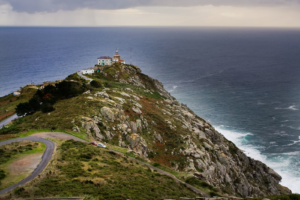
SV That raises the question: could there be a European poetry to do justice to the plurality of legends-that-might-have-been, since you seem to have a plurality in mind? Phrasing it this way, the answer is going to be ‘no’, almost inevitably; I guess the job of a European poetry might also be to tease out some of those legends. I wonder if you have any in mind in particular? We should anyway see if we can formulate some hypotheses in the course of this correspondence. Obviously, there was the myth of Europe herself, the princess abducted by Zeus, but that didn’t found any empires as such – let alone any bureaucracies in Brussels. But then, of course, there have been political projects that were legendary in scope. The Romans certainly did have a feel for foundational legends, and their empire was the first major political project to attempt something like a unification of the continent. The ‘legend’ of Julius Caesar certainly became a model for a number of subsequent such attempts, which might have explicitly imperial pretenses, from Charlemagne to Hitler. (The Catholic Church constitutes the spiritual parallel branch of this imperial lineage).
If there is one major difference between those projects and the contemporary project of European unification, it’s the lack of such pretense. A lack of regalia. We have no ‘emperor’ today. We are very far from worrying about whether or not he should crown himself or whether the Pope is going to steal the honors.
Still, there may be irreducible traces of empire – in another poem, Pato suggests as much. Describing, near the opening of her book Hordes of Writing, what seems like an ancient itinerary – a people on the move towards Galicia:
It’s best to sleep with the window open, rocked by wind and the torrential mix of every water, or on high peaks, or on the banks of the great fluvial arteries of her continent and with them (the arteries) on the sled of one of her woman ancestors she crossed the Rhine, frozen, and continued on foot along Imperial trails toward the country of great forests / / heading always toward the purple of sunset, from the Black Forest over the pass from the Jura to the Vosges, the wide Saône plain, fertile fields of Champagne and Poitou (Jurassic), the region of the Landes or the cradle of Aquitaine (Tertiary), the icy passages of the Pyrenees, the Cretaceous nation of the Basques, the Cantabrian cordillera and the Navia River
Empire has left a trail across which the heroine, or her ancient counterpart, traverses Europe towards its border. This imperial residue does have certain effects, as does its counterpart, the barbarian. Hordes on the move, threatening to destroy the empire. Bringing linguistic instability, unreadable codes of law. Against the institution of a unified liturgy, a variety of heretical practices: the Pantheon come home to roost. The Fall of Rome surely belongs to the great tales of European history. But it’s not foundational either, definitely not! Indeed, one way of reading the present political project of Europe would be that the legend that it is effacing is precisely that of barbarism and conflict. We have a number of strands here, which I want to use to formulate the three first hypotheses, without elaborating on them for the moment, without worrying about their compatibility, and without pretending that they exhaust the options:
I. European poetry must be in an imperial language, so that it can communicate
widely.
II. European poetry must be in a particular language, doing justice to particular
stories and identities.
III. European poetry must be in a barbaric language, doing justice to what came
before foundation.
FK I wasn’t referencing any particular tales – although Europe herself came to mind of course – that could serve as new foundational myths, but thinking about how ‘legend’, all these ancestral tales, spun through the ages, could be seen as something persistent, rather than restorative, in the face of the abstractions of the official European project: a language that continues to haunt us and reminds us of the conflict expelled from the European project. As a practice of writing, reading and translating that might offer glimpses of a different pasts and futures – in particular that of different locales. Writing from a position of alterity, then, Pato estranges Europe from itself, and tests its limits by introducing parts that can’t be contained in a unified narrative. Clearly, her work is expansive, continually shifting terrain; it aspires to a wideness, a breadth of seeing that is not the wideness of imperialism, nor that of simply difference (which has its own imperialist tendencies), but something more resistant.
Which brings me to another text, or set of texts, that I think could offer up some ideas for this correspondence, and echo the concerns we talked about. It demonstrates the territorial and linguistic limits of the European project in a very straightforward way: through writing that, for most people, is illegible. I’m talking about The Grefsen Address here, by Norwegian poet Paal Bjelke Andersen. This text could be read as a dramatization of the hypothesis formulated above – what language for European poetry, and is their indeed one? As Against Expression: An Anthology of Conceptual Writing, in which an excerpt of the The Grefsen Address was published explains:
Paal Bjelke Andersen’s text is based on nationally televised speeches by the presidents or prime ministers of Nordic countries (Denmark, Sweden, Iceland, Norway, and Finland) between the years 2000 and 2009. From the raw text of those speeches, Andersen retains certain elements: all sentences mentioning the Nordic community, every sentence mentioning the word language (e.g., språk in Norwegian), all the names of places, all sentences with the word border (e.g., grense in Norwegian); all the single groups of people mentioned; all sentences with the word war (e.g., krig in Swedish), and every single person mentioned. He also notates his own geographical itinerary walking from his house, around the Norwegian parliament and back home, including every street crossed and every commercial organization passed. Between location and locution (“address,” in both its senses), between the discretely local and the shared assemblage, the word and the action, Andersen traces the terms by which we describe and construct political space.
The Nordic community invoked by Andersen mimics the greater European community it is part of, but also shows how particular concerns cut through it. For example, the non-Nordic reader, and even some Nordic readers – we have to be reminded that Finnish is not a Indo-European language, and therefore does not resemble either Norwegian, Swedish or Danish, and that Icelandic diverges from the continental Nordic languages in a number of ways – are excluded. At the same time, however, as a form of conceptual writing, it speculates on the possibility of a higher-level legibility. The truth/truism about conceptual art is, after all, that once you get the idea, you’re able to understand it, and possibly participate in a community that potentially could include anyone. For a text that is to a large extent illegible, it has the potential to communicate on a massive scale.

Does not The Grefsen Address, as multi-linguistic poetry, represent an excellent terrain for interrogating the different strands that you’ve listed, maybe even showing their compatibility? Depending on how you look at it, it can be read as an attempt at the becoming ‘other’ or ‘minor’ of imperial language or as a demonstration of the ability of the ‘particular’ and ‘barbaric’ to speak across local contexts. Or is its project of mimicry doomed to reproduce some problematic aspects of the imperial itself, and am I glossing over some tricky questions, like my own privileged geographic location, or the availability of a far from neutral ’third language’ – English – that make these reflections possible in the first place?
SV Perhaps our fourth hypothesis on European poetry should be:
IV.
Alle skal lære
det danske sprog.
Or, what is absolutely equivalent: Derfor må de/lære norsk. Or a close enough variation: Modersmålet är ett/viktigt instrument när//man skall lära/sig nya saker.
It’s a great text, The Grefsen Address. A few years ago, the Flemish review nY (of wich I’m in the editorial board) published some fragments of it for our issue on multilinguistic writing. We decided to publish the excerpt as given, without any translation. This led to a funny exchange with one reader, who complained that we had published something that was unreadable to him. I wrote back explaining that this was maybe part of the conceptual nature of the text, to which he replied ‘Well, the experiment was a success, but the reader died’. Fair enough!
Though, once you think about it, and take a bit more time with the text – it’s not that unreadable, really. Certainly if a reader knows Dutch, German, English already, it’s possible to mostly piece together what the presidents and the prime ministers are saying. It’s not as if those individuals are saying massively original and brilliant things either, they’re just democratic politicians, who tend to say very similar things anywhere, no matter what their language. And in fact, something very surprising happens when you take a banality, like a politician saying that everybody should learn Danish, out of context and put it into a context of international poetry. First we had a formula for run-of-the-mill regionalism, even latent xenophobia, no matter how true the banal fact that it’s always a good idea to speak the language of the country you live in. Politicians say such things, things that sound reasonable and perhaps even have some merit, in order to create their constituency. Performative politics: Danishness (Norwegianness, Swedishness, etc) as such is created by pronouncements like these.
But the moment the pronouncement ceases to address some fixed community, it becomes a lot more interesting. It becomes a weird poetic truth. Yes, it’s absolutely true that all should learn Danish! Because we want to read The Grefsen Address. And similar things are equally true for any other language. Suddenly, the very same text inaugurates a completely different type of political performance. We must learn Danish, and the text we have before us is both what incites us to do so, what motivates us to do so, and what will teach us to do so. We will learn Danish by the Jacotot method that Jacques Rancière writes about in his book Le maître ignorant: we’ll just read, and figure it out. We might just find ourselves understanding Danish.
In that sense, it does go beyond the universalism of conceptual communication. I would say that the concept is not only there to be merely understood – the mode of reading that some conceptual poets claim to promote, in which once you ‘get the idea’, it’s enough and you can basically stop reading. It can be more engaging as well, an incitement to redraw boundaries. It can force our understanding of how we should understand. Man skall lära sig nya saker.
Obviously, the four Germanic languages in the text will be more approachable (to most of us) than the non-Indo-European one. But is the problem fundamental? In the same issue of nY, we quoted four poems by the German poet Ulf Stolterfoht, from his extensive series of Fachsprachen (parts of which were translated into English by the American poet and publisher Rosmarie Waldrop as Jargons). Stolterfoht seems to approach just about every bit of language material as jargon, as something technical, as something that you may, as a reader, not quite get, but that you’re not entirely outside of, either. So he pieces together poems from words of which you can’t be quite sure whether or not you know their meaning. One such sequence was pilfered from dictionaries of languages that Stolterfoht probably doesn’t even speak. But you can always pretend you do:
kappale + lude. sonni mies tuntemann
luotsi eines suu huurre. bussi. läkkipelti.
pakkaus: sade/massa-teknikka.
supi seksuaalinen. ava isä nyt arka
synty? iso kaino. summa laude kumma.
It’s Finnish, but not as we know it! Here’s what Google Translate suggests a Fin might be reading here: “piece + bedbug. bull man tuntemann pilot eines foot frost. the bus. Tinplate. packing: rain / mass technician. Raccoon sexual. Now the father opened a sensitive source? big coy. The sum laude on.“ A German would read something different again of course, since some words were clearly chosen for their German resonances. There’s one in Dutch as well, and I’ve always found reading that text exhilarating, an almost ecstatic experience, because I feel I’m at the same time inside my own language and outside of it. “Schaterlach”, meaning a very loud laughter, becomes at the same time something like “Schatten-lach”, a shadowy laughter. “Kool”, a cabbage, is suddenly banal hipster English
infiltrating into German.
The detour offered by Stolterfoht’s tactics suggest at least one experience that is universal, which is that of not understanding – and the great thing is that when he’s no longer addressing his own German readership, he allows certain readers to start misunderstanding their own language. Now, is that universal experience sufficient to occupy the position of a third language? And can it tell anything?
V. European poetry must be a form for misunderstanding language.
Or is it mere play, skirting the imperial issue?
FK Maybe we could rephrase this kind of experience as an experience of (non-)sovereignty. Sovereignty not just in terms of legislative power over a certain geographic territory, but also in the sense of being the only true legislator of one’s actions, according to the view of the subject championed in liberal political traditions. Both The Grefsen Address and Ulf Stolterfoht’s Fachsprache start from an experience of not being in control. One the one hand, they compel us to learn, they communicate that anyone can master a certain language and can become a sovereign person through by doing so – the reference to Rancière’s Jacotot is right. On the other, and this is the option I would like to explore here, they show – or rather they perform this question – how to act in situations in which you are not autonomous, and maybe don’t need to be in order to constitute yourself politically, in the presence of others.
VI. The experience of non-sovereignty can provide new structures of solidarity.
Maybe these texts could be read as providing scores: in one of the closing sections, Andersen performs a walk from his house to the parliament, listing all the commercial enterprises on his way. It documents the way in which public space has become saturated with economic interest, but it is (or was, because in the book it is archived) first and foremost an activity, indiscernible as text, action or performance. Can skirting acquire a political valence this way?
What this makes clear is that an experience of non-sovereignty – and I’m picking up on Lauren Berlant’s work here – can be as important and transformative as one of sovereignty, making it clear that there are others ways of ‘being political’. Lauren Berlant is an American theorist, author of the book Cruel Optimism (2011). In it, she developed the concept of ‘cruel optimism’ in response to the dissolution, on a massive scale, of post-war promises of durable intimacy, job security and other social contracts under the influence of neoliberal normativity. Although she is an Americanist by education, her archive of dealing with these pressures is not exclusively American, but European as well. In neoliberal normativity, sovereignty would be the – aspirational – idea of personal autonomy, selfassertion and performative action. The problem with this conception of sovereignty, as Berlant has shown, is that it favors dramatic, spectacular forms of action over practices that seem self-indulgent, passive – or mere play. Play does not invariably need to be shallow, merely reproducing the artistic or political or technocratic boundaries. It can become transformative too. What it transforms here, for example, is specialist discourse with a semi-public resonance and what it turns it into is a non-specialist language that is truly common. The irony might be that experimental and conceptual poetry have become specialized languages themselves, but this is not the only conclusion we can arrive at. They can be understood as a détournement of the commodification and curtailment of play and artistic potential, for example in Creative Europe policies, the E.U.’s official cultural policy that seeks to instrumentalize creativity in even more aggressive ways, turning art into a mere sub-branch of the creative industries.
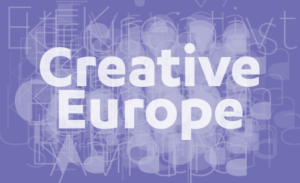
The problem of empire however remains. Creative Europe policies, as I see them, are a massive attempt to integrate art even more fully into the economy, abolishing any residual traces of its special status or critical abilities, and accelerating wealth redistribution from bottom to top. Artists find themselves in positions that are less and less sovereign and autonomous.
The ‘migration’ of national sovereignty used to be a contract that, while giving up on a certain autonomy, secured wealth and peace among the union; nowadays, it seems as if Europe can no longer live up to this, or doesn’t need or want to. Currently, Europe is in the throes of a toxic policy of austerity, subjugating its populations to the rule of financial markets, throwing them into debt, disciplining them fiscally into becoming more pliant subjects. It seems like an ancient form of sovereignty has returned here, in which people are at the behest of someone else, as the power to let live or perish.
Speculatively then: how does this experience of non-sovereignty in these art works– if you agree on this – relate to the political problem of national sovereignty, which has always been one of the contested issues in European unification, and how can it illuminate this, especially in these times of austerity?
SV It’s great how this correspondence develops, throwing ever more balls into the air, introducing ever more strands, going off on tangents, performing the complexity of our subject, until it’s hard to keep everything tied together. I guess we shouldn’t be too concerned if we fail and a ball drops. We, poets, critics, theorists, speculators, players, should not try to succeed at the tasks that our political system has failed at. We set ourselves different tasks, and the extent to which we can set these tasks is the only definition we might have of our own sovereignty. We have to explore the subject through living it – which would involve this non-sovereignty, perhaps? In this case, maybe our task has to do with an exploration of the wilderness of the European idea, its complexity, with learning it as a foreign language, perhaps to achieve no more than to express our bafflement with it, our inability yet to imagine it fully and give it the poetry it so desperately desires.
And now We roam in Sovreign Woods –
Your introduction of the word ‘sovereign’ sent me off on some further tangents. Some winding forest paths perhaps, if I may be pardoned the romantic image (once, I was impressed to read in a history of medieval Europe something to the effect that one of the main achievements of the 12th century was the deforestation of the continent!). Anyway, it’s a complex word. If I read you correctly, you’re using it to indicate two political levels – on the one hand, that of our autonomy (versus our being in the grip of capitalist or other technocratic systems); on the other hand, that of the problem of national sovereignty. Indeed, what could the connection be?
Certainly, there’s a politically widely exploited sentiment of agency being taken away from us – which, conveniently for the populists, is readily symbolized in the form of the Brussels bureaucracy. Europe lends itself perfectly for that. Since it has no herofounder, no Emperor, no regal attire, it also quite simply lacks sovereignty. Right from the start, the European project has refused to write (epic) poetry after Auschwitz, instead choosing to write trade agreements about coal and steel. On this basis, you can’t hope to raise any sort of sovereignty, because that needs something glorious, half-divine or epic, something by the grace of God. By sidestepping that Europe has become a perfect negative image of sovereignty. No wonder that in so many national political discourses Europe has emerged as the ultimate image for the sense of loss of autonomy.
Now, would it be in line with your point of view above to say that we might actually be better off singing this very loss of autonomy? In that case, should Europe in poetry perhaps be a lack – or even an object of desire – rather than a foundation? And we get
VII. European poetry must be lyrical since it can’t be epic.
The alternative, to try to write the Tale of the Glorious Exploits of Robert Schuman and the Knights of Coal and Steel, may be not be feasible in a way that isn’t fatally ironic. I do wonder, how all this might connect to your suggestion that the experience of nonsovereignty could provide the basis for solidarity – how to put the ‘solid’ into solidarity without such a foundation?
But there’s more to the word ‘sovereign’. Your using it reminded me immediately of Emily Dickinson, and of Susan Howe’s study My Emily Dickinson. Indeed, the line I quote above is from the Dickinson poem, My Life had stood – a Loaded Gun, which is the subject of Howe’s extremely detailed reading in the book, in which she meditates on the social and historical context of just about every word in the poem. In this line, Dickinson is imagining that she is the gun who has been taken by its master to hunt the woods. I’ll quote some of what Howe has to say about the word ‘Sovreign’:
The poet is an intermediary hunting form beyond form, truth beyond theme through woods of words tangled and tremendous. Who owns the woods? Freedom to roam poetically means freedom to hunt. Is the territory Shakespeare roamed in sovereign, untouched since and still untouchable? Dickinson antiquely spelt Sovreign as she capitalized ‘S’ to both fracture and fuel its power. Sovereign – European origin. (…)
The United States, peopled by citizens fleeing into freedom, had no sovereign after the Revolution. Some of these citizens, escaping religious and political persecution, brought the institution of slavery along with them. (…)
Dickinson takes sovereignty away from God and bestows it on the Woods.
From the American perspective, then, sovereignty and Europe recall very different histories again, which are worth exploring more deeply. But for now I want to end with another observation. Howe and Dickinson are not the only non-European voices to have appeared in the course of our correspondence. Chus Pato has become known to us in the Netherlands in large part thanks to her Canadian translator, the poet Erín Moure (it’s no coincidence that the two were guests at Rotterdam’s Poetry International festival in consecutive years). Both you and I have come to know Andersen’s work through an anthology by the Americans Kenneth Goldsmith and Craig Dworkin. I think you and I both have learnt about Stolterfoht’s work independently of his American publisher, but I did mention his translations into English – by an American. You mention Lauren Berlant, an American theorist. Perhaps such voices from outside are to be ineluctably part of how we may imagine Europe, and perhaps that is precisely because in its contemporary form, it lacks its own sovereignty.
FK A lot to respond to here! Yes, I do think that the absence of sovereignty is a powerful affective experience, shared among and across many different people, who are not necessarily in the same ‘location’ in terms of the language they speak, their nationality, gender or class. Poetry dramatizes this, as dislocation has been a recurrent element in this conversation. Echoing Berlant again, I would say that sovereignty might mimic the kind of traits you ascribe to it – grandeur, divinity, or more down-to-earth, a kind of self-willed action, but functions, in practice, as a normative ideal, not as a solid fact. And in the age of precarity (austerity?) we cannot hope to resurrect the solid foundations of the bygone era. But might we envision a form of being together that does not operate on the basis of structural forms, but on shared affective, bodily experiences? Affect is almost nonsovereign by definition – its power does not pertain to persons but to worlds.
For me, contemporary lyric, in its most illuminating, incisive forms, highlights precisely this power. I am thinking of Rob Halpern here, an American poet again, whose work the two of us translated together and was discussed by you in your essay for ACT, Lenin’s Desire and Poetry, for its politics of desire. His book Music for porn enacts this form of solidarity with the intensely mediated bodies of US soldiers and Afghani boys, either dead, erotic, militarized or mutilated, with the risk of perversion and solidarity remaining only gestural. But it might be risks we have to take; in the essay, you have written that the task of the lyric is to invent new forms for desire, and to imagine new desiring subjects. I agree, and would like to expand on it a bit.
It is interesting that the poetry that we have so far chosen as examples in our correspondence clearly negates the lyric as a self-enclosed form, explodes it, allowing it to branch out into manifold directions. The porous prose fragments of Chus Pato, Andersen’s and Stolterfoht’s ‘conceptual’ mode (albeit taking a ‘performative turn’), Howe’s discursive, encyclopedic range. The latter, like Pato, presents us to the wilderness of writing – a sovereignty of the woods (where hordes might also roam).
I wonder, does it suffice to call this poetry lyrical? Is it not in a way (buzzword) speculative? Speculative in the sense of re-imagining social relations but also in the sense the term has been taken up by various strands of philosophy recently, as a mode of thought that is both realist and speculative, extending both to the realms of the pre-human, the post-human, the non-human. Somehow, it rings true to think of the poetry we have talked about as being both too.
VIII. European poetry should be speculative and invent new genres for living and writing.
SV The invention of genres for dealing with loss of sovereignty: certainly a program for poetry worth pursuing! What I do wonder is, is there anything in European experience(s) that might shed light on that theme in a specific way? When you mention Rob Halpern’s Music for Porn, I instantly understand what you mean. In that book, he writes a poetry of being acted upon, both directly physically (he often alludes to being wounded, pierced, as soldiers may be in war) and affectively (the poems register being aroused, seeing your feelings and desires being addressed, sometimes, in fact, by imperial propaganda).
Now Halpern’s work is strongly conditioned by the situation of living in the 21st century USA. That raises the question: living in the States, how are the ways of being gripped by Empire similar, how are they different, from living in Europe? Undoubtedly one can trace the similarities to some big abstraction like the capitalist world order, which acts everywhere. We are, all of us, gripped by a logic of market values. But Halpern strongly focuses on the military as well, singing of being in the grips of a militarized language, of living among military imagery everywhere. This is all very much in response to the Iraq and Afghanistan wars, though of course there’s a history in the USA of being almost permanently in a state of war, that has gone on for many decades more. And much of today’s Europe has effectively been complicit in this.
But since we’re talking about the past decade of international politics anyway, remember Robert Kagan? – he was a co-founder of the Project for the New American Century, the neo-conservative think tank, and on the eve of the Iraq war he published an influential study of international politics called Of Paradise and Power. In that fearsome tome, he literally wrote that “Americans are from Mars and Europeans are from Venus”! Meaning, Americans were supposedly living in a Hobbesian world in which life is all about military action, whereas Europeans whiled away their time in a Kantian world of peace and treaties. Obviously this was a crass simplification, and in fact the way it was read and discussed at the time made it clear what its real intention was: to be a form of politicaltheoretical intimidation. But that also means it hit upon some sort of libidinal truth, implying different ways of becoming non-sovereign. Americans were directly implicated in imperial brutality by their own government and in their daily life suddenly had to deal with an increased intensity of flag waving brouhaha, whereas Europeans, even though quite a few of them participated in the war directly, got landed the spectator role from the vantage point of Paradise, where they could be fascinated with the spectacle of American power, either relishing it or being revolted by its excesses. One might ask, which form of implication is more perverse?
It’s not the Kaganian analysis as such that interests me. The best that poetry could do with that sort of thing is perhaps paint a more complex and more real picture – and this is one reason why I find the war memoir poetry of our friend, the poet and air force colonel Ton van ‘t Hof, so valuable. Some of his best work makes it clear that even as a mere Dutchman, you are implicated in the military branch of imperial politics, and also that being part of it does not necessarily mean you know where you are, and that being in the military, even at higher ranks, can be disempowering. That aside, what interests me, rather, is the importance of American sovereignty, even for our experience. Rob Halpern is dealing with the hold that American militaristic interpellations have on him, and we can almost read his poetry as our own. A poetry that sings of how more abstract capitalist structures have a hold on us will be readable for us, too. But I can’t think of examples of a poetry that sings of how the Brussels bureaucracy has a hold on us. This is the converse of the lack of European epic.
I would like to connect this to the earlier observation that we seem to need so many non-European voices to talk about Europe and poetry.
IX. European poetry is non-European poetry
I can think of two poets who have written longer poems called ‘Europe’: the American John Ashbery and the Russian Kirill Medvedev. Are there any E.U. poets who write about Europe? (Even the term ‘E.U. poet’ sounds awkward). Perhaps, to name ‘Europe’ in your poem, you need to have some sort of outsider perspective, precisely because there is no decisionism governing the European self-image that gives it nationhood.
FIELDHAND
Even though we live where we live–
And it may be rather far–
We are all Athenians.
VINEYARD WORKER
Athens has no city limits.
DOCKWORKER
“City limits”
Is not a conception of ours.
PUBLIC CRIER
No, there isn’t for this big city,
Big in the sense it’s an extended city,
There isn’t a physical end to it, no line
No definite material barrier at all,
There is no circumventory wall.
(The WORKERS, along with many other citizens, arrive and keep arriving, at the Pnyx.)
This is a fragment from Kenneth Koch’s One-Thousand Avant-Garde Plays, in which Koch tries to imagine History, with a very strong presence of Europe throughout its pages (it helps that the New Yorker Koch was a Europhile, and inspired by Fernand Braudel’s history of the mediterranean). Here he’s talking about ancient Athens of course, but it can serve as an ideal image for Europe. Borders are porous, identity is a purely pragmatic affair.
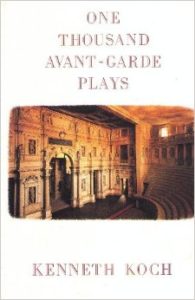
Within Europe, that is. If there is really such a thing as ‘within’ for Europe. Because I would like to offer some further speculation, which goes back to affecting and being affected. Europe has been the most expansionist continent in history. There was a time when almost the entire world was affected by some European power. The effect of that is that ‘Europe’ has been laid over the entire world. This implies that Europe no longer has a proper outside. Europe really belongs to everybody in the world – perhaps except to Europeans themselves, who have no idea how to imagine it! So Europe is not managing any internal imagination of what might shape it, but people coming from elsewhere – who, therefore, have been in their histories affected by Europe – can offer such descriptions of Europe. Once affecting, Europe now becomes itself affected – and an affect. Maybe one can best write lyrical poetry about Europe when one comes from outside, when one longs for it.
X. The greatest European lyric has drowned just short of reaching Lampedusa
Or, a bit less extreme than that, could we maybe read this poem by the Iraqi-born Rodaan Al Galidi, who has lived in the clutches of the Dutch asylum procedure for many years, as a European text of non-sovereignty?
Zorro sings for Schiphol Airport in the eighth year of his imprisonment inside a cold computer.
Only you and death, Schiphol,
can lift me up
from this ground
where no rope,
no hand can reach.
Open the door to your celestial iron
and let me go.
Your outside
all hard glass and control.
Your inside
all wings and heaven.
Let me rise up, Schiphol,
as spring does her colors,
as ships do their sails.
This garbage bag
in which I and my sorrow
are held prisoner,
lift it up.
Move the waves of your escalators
under my feet
like a river of departure.
Glass prophet.
Beach of iron wings.
Death makes the soul rise up.
Schiphol,
take my soul,
my body and my bag
far from here.
FK Yes, would there be something specific in European experience that might shed light on the loss of sovereignty?
Going further back, there is the Great War of course, a ‘Literary War’, but that was a heroic event that would set Europe free and give it a new purpose – the closest we have come to a European epic, though it turned out not to be a single one, but rather a plurality of epics and destinies. Nationalism was refueled during this time. Today, Europe seems to lack these kind of experiences, and it seems to shun them too: the lack of new historical experiences as such seems ingrained in its project. It aspires to be post-military, postethnic and well, yes, post-historical as well: a technocratic utopia that can never relapse into its brutal past.
Of course, this is aspirational. It is a self-image, and one increasingly difficult to uphold. Europe has become a project that continues these struggles with other means, or as obscure accomplice of other powers, without overtly displaying power itself. Lampedusa is one name for that, the current austerity rhetoric another. Vaguely authoritarian, but mostly with an appeal to democratic sentiment: we are all in this together.
In that sense, Al Galidi’s poem provides a wonderful index: the imagery is close to the terms and tropes many thinkers – think of Lieven de Cauter’s ‘capsulary civilization’, or Peter Sloterdijk’s ‘crystal palace’ – use to describe contemporary globalized Europe or power structures in general, invisible but with highly material and often brutal effects. This is also the loss of sovereignty: it does not immediately lead to new benign worlds of sharing, to networks of solidarity, but may be instrumental in the perpetuation of power relations. What is remarkable about Al Galidi’s poem however is the optimism that it clings to, despite all of this: Europe figures as a kind of Schiphol of the mind, where one can roam freely. One could call this sentimental politics, and very phantasmatic, but it transforms the experience of powerlessness into something powerful – with a hint of political refusal, prefiguring the title of his last poetry collection, ‘Liever niet’, antwoordt de liefde [‘I would prefer not to’, love answers].
Against the postmodern empire of ‘hard glass and control’ that Al Galidi sings of rises the equally postmodern but rather different imperial project of Eurasia, which is another converse picture of the European project. Until not long ago, alternatives to the European project proved unimaginable in the minds of enlightened bureaucrats. Now we see something quite different: we only have to look at what’s happening in Ukraine to see the shift, and it is no secret that Putin wants to restore the great Russian empire.
Kirill Medvedev’s poem Europe dates from 2004, but can be read, a little against the grain perhaps, as a meditation on Europe from a point outside of it – that of Eurasia, a concept formulated by the extreme right-wing political ideologue Aleksandr Dugin, which stands for a political unity extending from Russia to Central Europe, the annexation of Ukraine and other Russian speaking territories and which is vehemently opposed to the European union. The seemingly banal point of departure of the poem – the poet’s ride, through Europe, by bus, to perform at a festival in Rome – becomes a meditation on Europe precisely as an affect and as something affecting. Medvedev mixes all kinds of powerful ideological fragments, on which he ruminates without discriminating between them, and the drama of the poem comes from the fact that it simultaneously, rather dubiously, echoes traits of the Eurasian project – not in its exact contents, to be sure: Kirill Medvedev is a committed leftist – but in its rejection of liberal democracy, which is perceived as cold, sick and weak. This liberal democracy is equally despised by someone like Alexander Dugin, for example. I think Medvedev is trying to make sense of this unwilling synthesis in the poem, and suggesting that Europe is an ideologically as unhealthy project as Eurasia. But I’d love to hear what you think.
For example, Europe figures as something decadent, as a place where people get pushed around in wheelchairs as tourists, where everyone rots away as a lazy spectator and where history has petrified:
moving, always moving,
we can’t sit here forever,
we can’t keep doing this,
we need to move, move,
movement—
this is impossible,
this paralysis,
we need to move,
I close my eyes and see movement, I see large camels, I see
my distant relatives,
I see how my relatives or specially trained nurses
take mortally ill patients through Europe
on wheelchairs;
these are tourists,
most or all of them are tourists,
I see that all tourists
are like these sick people,
I think of what one can do in such situations,
one should anticipate them
the real
the impossible
the never-happened
journey, and not look at real ruins
with lizards crawling on them
not drag one’s already
dying body (one’s weak, ill-formed, or alternately well-formed and
slightly foreign body)
through these pleasant cities
The poem also contains fantasies of ‘Europe after the flood’, when it has been inundated by people from all over the world – Turks, Arabs, Chinese – shocking the gentle German bourgeoisie. These neo-fascist speculations about ’the great migration’ however are countered by fantasies about ’the great mating’ of peoples, culminating not in a radical
ethnicization of politics but in a radical de-ethnicization of it, in a post-ethnic vision of the world where neither Europe or Eurasia exists, nor any other ideologized, geopolitical project. Maybe these are the stakes for European poetry?
SV It’s a great poem. It’s disturbing and funny, too. Among other things, it’s a paean to stupidity. Take the camels in the lines you quote. They are funny, because they’re an orientalist image and therefore out of place in Europe. That is an intricate irony, though, considering that Europe itself has no identity or limit, having once colonized the whole world. In the world of the poem, it takes a total idiot to drive the point home. The camels appear already on the first page of the 20-page text. The poet is in the bus with a group of athletes, and one of them asks the poet what country they are entering:
Poland, I say.
so that’s what, the EU? he asks.
no, I say. Poland’s not in the EU yet.
what other countries are we going through?
Germany, I say. Austria
he nods
Portugal, I lie; he nods again;
I could have said Greece, Syria, Ireland–he’d have
nodded.
oh, mighty athlete,
our bus will travel through Iceland,
we’ll see sheep, deer,
muskoxen;
we’ll see camels
It prefigures a stupidity with transformative potential later in the poem, right after the bit you were quoting above. People in the pleasant cities drink ‘everything that’s not tied down’ until ‘everything ceases to exist’, including peoples. And then ‘a rupture will come/ and some as yet inexistent people/(like a person vomiting into a sink)/will lean over us’. And the rant goes on, as the poet also voices the hope that these vomiting inexistent people of the future will leave us alone even as they ‘lean unceremoniously […] over our raw experimental graves’ studying ‘what exactly/had made us go crazy’. The poem’s ranting passages themselves already seem drunk on the possibility of this future, putting the poet on his bus trip already with one foot in the delirious, ecstatic, terrible position of this vomiting people to be. I agree, Frank, that this is a particularly striking and provocative poem from which to read Europe.
Will it indeed take an apocalypse of drunken stupidity to bring about this post-ethnic future? Just today, I read that a new report finds the Antarctic ice melting more dramatically than expected. Most likely, humanity has already, irrevocably, set into motion a more than 20 meter sea level rise. How’s that for an inundated Europe? My first reaction was to think: amazing that there are still people in our country who think it’s really important to have debates about securing Dutch national identity. Drowning not only happens to the people on the ships just off the Costa da Morte and those trying to reach Europe’s southern coasts – the water will get closer to us. Such events, even though they may take centuries to unfold, will redraw the maps. Some day, millions of Dutchmen will have to make a scramble for the mountains and they will totally have to give up the entire idea of being from the ‘Low Countries’. Maybe then, when we are all in the same boat, we will at last find out what it is to be European. Or simply, a human being. Let’s hope. Until such a time,
XI. European poetry is a preparation for when we will be forced to be European.
Let me end my final contribution to our correspondence (which I greatly enjoyed – thank you for that!) on a lighter note. Ships, planes, the bus: we find ourselves talking about vehicles for public transport a lot here. For me, the one vehicle on which I feel most ‘European’ is the train, however. For a while, you could actually take a direct train from
Amsterdam to Moscow. But it’s also on the trains that I think I remember my first sense of a European literary experience as a child, seeing messages telling me not to use the bathroom in the station or not to throw stuff out of the window in four languages in quite regular trains. I couldn’t read these. But they excited me.
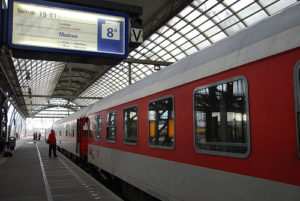
FK I remember that train. One day I ended up at the wrong platform on Amsterdam Central and I saw it. I was instantly mesmerized. Vast intercontinental train rides have always had this magnetizing presence for me. I had to stave off the thought of hopping on.
Last month I found myself on a train to Berlin. In Berlin I had conversations with lots of different young poets from all across Europe (and beyond). And there I suddenly had a very practical understanding of what it means to be a young poet writing in Europe today: there are great opportunities to connect to wider communities and to fuel conversations in poetry and poetics that would have otherwise remained closed off. The scattered availability of poetry on the internet is opening the genre up. It has made my writing process more porous, more receptive, less solitary in a sense. I think this is wonderful and I am excited that this is happening, and that it is happening through these bottom-up networks. I hope I can contribute to building these networks, and this conversation has certainly helped me think Europe as a literary as well as political space in new ways. I want to thank you for that as well.
Samuel Vriezen (1973) is a poet, composer, translator and essayist based in Amsterdam. His most recent CD The Chord Catalogue – Within Fourths/Within Fifths, a recording of Tom Johnson’s The Chord Catalogue, came out in 2013. Samuel Vriezen’s website can be found here.
Frank Keizer (1987) is a poet, editor, translator and essayist based in Amsterdam. His most recent book is Mijn eigen problemen (My own problems), published with Stanza in 2015. Together with Maarten van der Graaff, he is the editor of Samplekanon. Frank Keizer’s website can be found here.
This correspondence was commissioned by Art Cooperation Transmission (ACT) Democ[k]racy, a cross-European exchange of artworks, artists, researchers & students, and originally published in how to act? a publication from Onomatopee, Eindhoven, 2014.
